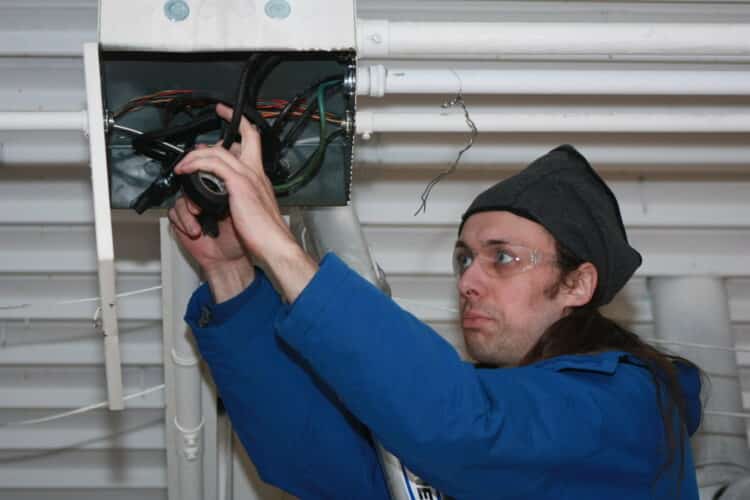
We all use electric services. In time, you may need an electrician’s services, either due to an issue with your electrical system or you need to add a light fixture.
Before you contact your electrician, there are several things you should know. Here are important electrician tips for any homeowner.
Table of Contents
Electrician tips you should know
Before you start any DIY electrical projects, here are a couple of tips you should know:
Understand your DIY limits
If you have a DIY mindset or you are simply an enthusiast, you should know your limits. Sure, DIY skills are important to develop and can come in handy when you are under a tight budget, and you need something fixed.
But, not all things are for you, and knowing where to draw the line is essential. Sometimes, it’s best to let the professionals handle things.
Or at least take your enthusiasm slowly. For instance, as a newbie, you may start by working with electrical components outside the wall.
And as you build your skills, you can advance to more complex electrical work like fishing cable. But first, if you live in an apartment, only remember to fix electrical components that your building department allows.
Additionally, as a rule of thumb, don’t let your DIY enthusiasm cloud your judgment and push you to tackle electrical projects you have no experience in.
A bigger problem may arise if you do so.
Electrical systems are more complex than you think
Everyone knows that white is neutral and black is live. Is that’s always the case? No.
The last thing you need to do is make assumptions when you open an electrical outlet. That can lead to a major disaster.
Do you want to know why? Because numerous people have worked on that outlet before you. Most of these people didn’t even have the proper training and never followed the code.
That is why you may find an electrical outlet has numerous fixtures that don’t make sense. Although you can still work on it, you need to be more careful.
Also, follow best practices like using non-contact voltage tests to confirm that the line you want to work on is dead. Additionally, you can check out common electrical code violation mistakes to prevent yourself from making any and spotting them as soon as possible.
Low voltage is still dangerous
Most amateur electricians ignore this fundamental but important rule, always take safety precautions. Whether you are working on high voltage situations or low voltage ones, it always pays to be more careful and treat each situation equally.
Also, remember that the issue isn’t the voltage but the current passing through. For instance, you can have a low voltage wire with really high currents.
You can get a mild electric shock that can lead to a major disaster by surprising you and making you fall from higher grounds or a ladder.
Additionally, while working with low voltage wires, ensure you secure the connection properly. If not, you may cause a spark, which may start an electric fire with the more combustible materials around.
That’s why you need to keep your oily rugs away from your low voltage device and securing the connections. If possible, check and double-check to be sure.
Lookout for vampire draws
More often than not, electricians get calls of exaggeratingly high electric bills. The most common culprit for this situation is vampire devices.
And no. we’re not talking of vampires as in blood-sucking monsters. Rather, it’s vampires as in power drawing devices even when not plugged in.
Now, these can leave your wallets empty. How do they do that? If you have any electrical devices with standby mode or remote-controlled devices, you will need to maintain a steady stream of power for them to wake up faster.
Also, chargers for laptops and phones still draw electrical power even if you did not plug in your devices. The best way to avoid a high electrical bill is by removing the chargers from the switch when not in use.
That can sure save you hundreds of dollars in bills.
Take warning signs seriously
Warning signs let you know if there’s a problem with your electrical system. At first, it may appear like a small issue, but it’s not.
That’s why you should never ignore any of these signs, no matter what your thoughts are on the matter.
Whether your light switch keeps heating up, or you hear a popping noise coming from your electrical outlet, or your breaker won’t reset, all these are signs you should not ignore.
If you do, the issues will fester and, in time, create an even more hazardous situation. Fortunately, most issues are easy fixes and won’t take much energy or time to fix.
Learn more about ground fault circuit interrupt (GFCI)
Possibly, you have a GFCI circuit in your bathroom. GFCIs protect all outlets you have that are at least six feet from a water source.
However, issues with these safety devices are more common than you can imagine.
And electricians get more service calls due to them- especially from homeowners with numerous bathrooms using a single circuit and outdoor circuits.
That’s why it’s important that you understand them. So how do they work?
GFCIs cut off power from your circuit if it starts losing amperage. That’s why you are more likely to spot them in bathrooms or outlets outside your home.
What you need to remember is that one GFCI device will protect your circuit going downstream. If your bathroom is not an isolated circuit, the GFCI will cut off the power to not just your bathroom but other outlets and lights that are not even related.
That’s why you should consider checking your GFCI to see if it’s triggered is critical while trouble shooting your nonfunctioning outlets.
Not all overhead power lines are insulated
Just because birds or squirrels survive standing on these power lines doesn’t mean it’s not live or insulated.
It’s safe for these creatures to stand there because they do not provide an easier path for the current to follow apart from the cable.
However, it can be quite fatal if you contact the lines while working on your roof or trying to trim a tree. That is why you should consider contact professionals for help.
So why are these power lines not insulated? Well, outdoor power lines are usually higher above the ground, and you can’t contact them.
That’s why you will find most power lines with only weather coating and spacers at utility poles as the only insulation. Still, if the lines are insulated (especially the ones you can touch from a tree or the roof), insulation will degrade with time and become ineffective.
If the power lines fall accidentally with you in the line, the result is fatal. That is why you need to approach these lines to know that tampering with them can be fatal.
Use actual safety/protective gear
As an electrician amateur, you need to remember that protective gear is only effective if you use the real thing.
Wrapping yourself in household rubber won’t help much since it is not pure rubber is not as great an insulator as you imagine.
The additive that manufacturers add to reduce the cost makes the rubber less unreliable. If any electrical issues you want to tackle makes you nervous, don’t do it without proper gear.
Make quality insulators and safety gear an essential part of your protective gear kit.
Always test to see if your outlet is grounded before replacing a two-slot receptacle with a three slot
Its basic knowledge- you can’t install a three-slot receptacle without ground wire. If you are looking for a way to use three prong plugs, don’t be tempted to replace your two-slot outlets with three-slot outlets.
Only do it if you are sure that you have a ground available. If you are unsure, use testers to find out.
You can get these in a hardware store or home center. If you find out your three-slot outlet is ungrounded, switch back to two-slot outlets immediately.
Holding down a circuit breaker is a terrible idea
How do circuit breakers work? By breaking the circuit. So what happens when you use tape to hold it down?
Easy, the circuit breaker won’t work properly, and the problem you thought you fixed will only amount to a major disaster.
The best way to fix a popping breaker is to identify the issue and fix it (not with a tape). If you’re finding it hard to reset your circuit breaker, you can ask a friend to help or go through several tutorials for help.
Child proof your receptacles
Children are always curious. Sooner or later, you may find them trying to insert a paper clip or any other sharp object into a receptacle.
The best way to protect your child is with tamper-proof receptacles. You can install them anywhere and everywhere, both inside and outside.
Always use a cover protection for your outdoor receptacle
Most homeowners only use flat covers for their outdoor receptacles. But these are only great when you are not using them.
So what happens when you plug in extension cords for long periods? There won’t be any form of protection for your receptacles. Is there anything you can do about it?
Absolutely. You can consider switching to bubble covers or other in-use covers. You can use it for wet locations that you are sure saturation with water is possible or any other danger your receptacles are exposed to outside.
That way, you can be sure that your receptacles are protected from the weather and anything else at all times.
Plus, that gives you the freedom to plug in your holiday lights at extended times and not worry about anything.
Besides, it’s a requirement of the national electric code to have weather-resistant and tamper-resistant receptacles in any damp and wet areas of your home.
Turning off your main breaker immediately is not a good idea
Many DIYers get one thing wrong- shutting off only the main circuit breaker while ignoring all the others.
If you do that before all the miniature circuit breakers are off, you risk overloading your main panel. That’s because an entire load of electric power has nowhere else to go.
If you do that, you will have an even bigger problem in your hands, and fixing it will be costly.
If you have to repair or fix any issue in your home, consider shutting off all the smaller switches protecting particular outlets in your home before you go for the main one.
Cheap can be costly
Like most people, it may be tempting to go for the cheapest option you have when buying replacements for your electrical system.
But that’s not always wise. That’s because most cheap replacements are not of higher quality and may damage easily, making you incur more costs than you would have spent upfront.
Your best shot is getting the real deal. For instance, if you need a tamper-resistant receptacle, read the label to ensure you got the recommended one.
If you pick the cheapest receptacle without confirming first, chances are it’s not tamper-resistant. That makes your kids more susceptible to getting hurt if they tamper with it.
While tamper-resistant receptacles are usually more expensive, they sure do a good job at protecting your kids.
Always prepare the work area before you start working
Whether you are planning to do it yourself or call in an electrician, always ensure that the work area has no obstacles.
That way, you can get the job done faster and easier than having to move things around (like furniture) while working. That way, an electrician can charge you less because it’s time to fix the issue.
Learning how to do basic electrical work is important
Possibly, these cautionary tips are making you feel less sure about doing your electrical work. Well, it shouldn’t.
These are just cautionary tips you should keep in mind when working with your electrical system. Being self-reliant is something that all electricians want for homeowners.
Sure, you may need professional help once in a while, but that shouldn’t stop you from learning along the way.
Whether you are interested in repairing simple issues or want to tackle even the toughest tasks, you can do so by learning new skills with patience and perseverance.
Final thoughts
Anyone can do electrical fixes successfully. You can learn the skills gradually and become self-reliant in doing almost all the fixes by yourself. However, keep these tips in your mind while at it.
That way, you can avoid making common mistakes and creating a more hazardous situation. Remember, you can also ask for help and guidelines from your local electrician if the fix is too complex.


